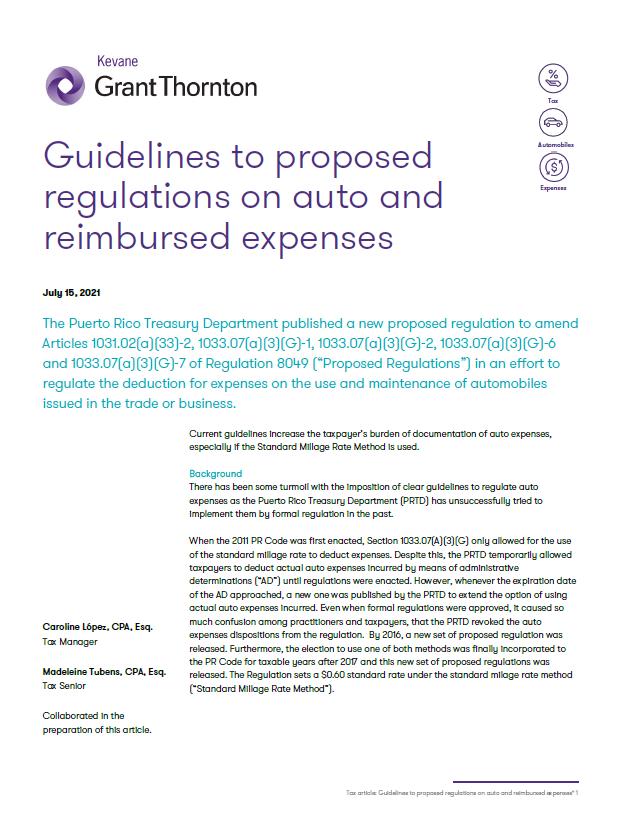-
Financial statements audits
Financial statement audits
-
Compliance audits
Compliance audits
-
Compilations and reviews
Compilations and audit
-
Agreed-upon procedures
Agreed-upon procedures
-
Tax compliance
Business Tax
-
Global mobility services
Through our global organisation of member firms, we support both companies and individuals, providing insightful solutions to minimise the tax burden for both parties.
-
Sales and use tax and indirect taxes
SUT/ VAT & indirect taxes
-
Tax incentives
Navigating the complex landscape of tax incentives in Puerto Rico can be challenging. Whether you're looking to benefit from the Export Services Act (Act 20), the Individual Investors Act (Act 22), or other incentives under Act 60, we provide tailored advice to help you maximize your tax benefits and ensure compliance. Let us help you unlock the potential of doing business in Puerto Rico.
-
Transfer Pricing
The laws surrounding transfer pricing are becoming ever more complex, as tax affairs of multinational companies are facing scrutiny from media, regulators and the public

-
Business consulting
Our business consulting services can help you improve your operational performance and productivity, adding value throughout your growth life cycle.
-
Business Risk Advisory
Risk is inevitable but manageable. We deliver relevant, timely and practical advices to aid organizations manage risk and improve business performance. We can help you identify, understand and manage potential risks to safeguard your business and comply with regulatory requirements.
-
Technology Advisory
We provide comprehensive solutions to safeguard your business and ensure operational resilience and compliance. Our expert team offers a range of technology advisory services designed to address your cybersecurity needs, enhance business continuity, and manage security effectively.
-
Transactional advisory services
Transactions are significant events in the life of a business – a successful deal that can have a lasting impact on the future shape of the organizations involved. Because the stakes are high for both buyers and sellers, experience, determination and pragmatism are required to bring deals safely through to conclusion.
-
Forensic and investigative services
At Grant Thornton, we have a wealth of knowledge in forensic services and can support you with issues such as dispute resolution, fraud and insurance claims.

Current guidelines increase the taxpayer’s burden of documentation of auto expenses, especially if the Standard Millage Rate Method is used.
Background
There has been some turmoil with the imposition of clear guidelines to regulate auto expenses as the Puerto Rico Treasury Department (PRTD) has unsuccessfully tried to implement them by formal regulation in the past.
When the 2011 PR Code was first enacted, Section 1033.07(A)(3)(G) only allowed for the use of the standard millage rate to deduct expenses. Despite this, the PRTD temporarily allowed taxpayers to deduct actual auto expenses incurred by means of administrative determinations (“AD”) until regulations were enacted. However, whenever the expiration date of the AD approached, a new one was published by the PRTD to extend the option of using actual auto expenses incurred. Even when formal regulations were approved, it caused so much confusion among practitioners and taxpayers, that the PRTD revoked the auto expenses dispositions from the regulation. By 2016, a new set of proposed regulation was released. Furthermore, the election to use one of both methods was finally incorporated to the PR Code for taxable years after 2017 and this new set of proposed regulations was released. The Regulation sets a $0.60 standard rate under the standard milage rate method (“Standard Millage Rate Method”).
Use and Maintenance of Automobiles
Under the Proposed Regulations, a taxpayer may choose to use a Standard Millage Rate Method (default method) or actual expenses to deduct expenses for the maintenance and use of automobiles. Once a method is elected, it should be used consistently throughout the taxable year. Complete and detailed records are required to sustain the expenses which should be available to the PRTD upon their request. No estimates are allowed. Records must document every aspect of the expense as required by the Proposed Regulations for either method.
To deduct the expenses, taxpayer must be the owner of the automobile or must have an operating lease. A taxpayer can also use either method for reimbursed auto expenses from their employees under an accountable plan. In this case, the employee must submit to the employer the documentation required under this Regulation as described below.
Standard Milage Method Documentation
Taxpayers who use the standard milage method will need to have a very detailed millage log and cannot estimate the miles traveled. Each trip log must contain:
- date
- place
- destiny of trip
- business purpose
- beginning and ending odometer count during the trip (“Odometer Method”)
- in the alternative, the taxpayer may choose to calculate miles traveled using the distance between Municipalities traveled or Millage Calculator published by the Highway Authority (“Milage Calculator Method”).
- a taxpayer may switch between the Odometer Method or the Mileage Calculator Method in any given day but cannot use both methods the same day.
The taxpayer must also account for the total mileage count of the vehicle for the year, the millage for business use and millage for personal use. This same ratio will be used to determine the portion of the depreciation expense that will be deductible as a business expense. Be mindful, that depreciation expense is a distinct and separate category.
Real Expenses
Actual auto maintenance and use expenses incurred in relation to trade or business may be used, given that all elements of the expense incurred are documented in a detailed matter. Please note, that this method is the only method available for taxpayers who have a fleet of five cars or more.
We will monitor the development of this Proposed Regulations and keep you updated through our Tax Alerts.
Caroline López, CPA, Esq.
Tax Manager
Madeleine Tubens, CPA, Esq.
Tax Senior
Collaborated in the preparation of this article.
We are committed to keeping you up to date with all tax-related developments. Please contact our Tax Department should additional information be required regarding this or any other tax issue. We will be glad to assist you.
